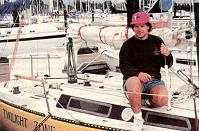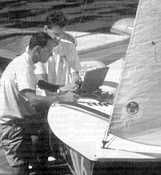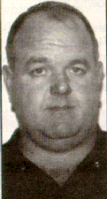Becoming a "Virtual Community"
By Bob StepnoIn the world of computers, "virtual" means something that exists thanks to electronic connections. Sailboat racing simulators may someday approach "virtual reality," when they figure out how to make you feel the spray. For now, yacht clubs made up of people chatting to each other over computer keyboards can become "virtual communities."
 Perhaps the strongest such community is in San Francisco, where the
participating boaters meet on the water, not just online, through a
series of bimonthly get-togethers called CyberCruises. The cruises
are open to both powerboats and sailboats and publicized on the
World Wide Web at http://www.microtech.com/cybercruise/, in the
rec.boats newsgroup, and on the San Francisco-based Well information
service (http://www.well.com). The closeness of the resulting
community was reflected in a message on the Internet this spring,
when a tragic accident took the life of a 20-year-old sailor.
Perhaps the strongest such community is in San Francisco, where the
participating boaters meet on the water, not just online, through a
series of bimonthly get-togethers called CyberCruises. The cruises
are open to both powerboats and sailboats and publicized on the
World Wide Web at http://www.microtech.com/cybercruise/, in the
rec.boats newsgroup, and on the San Francisco-based Well information
service (http://www.well.com). The closeness of the resulting
community was reflected in a message on the Internet this spring,
when a tragic accident took the life of a 20-year-old sailor.
The young woman's mother, participating in the rec.boats discussion group on the Internet, wrote a moving account of the unsuccessful rescue attempt by the crew of her boat Pink Panther, a Merit 25, and other racers. She posted the detailed account on the day of the accident, under the heading "Death on San Pablo Bay," as a plea for other experienced racing sailors to wear PFDs. It wasn't the kind of letter you address to a group of strangers.
A few weeks later, another Internet correspondent named Mark Graff wrote an account of another accident. He, too, had been swept overboard, from a white-water raft, and nearly drowned.
He added a postscript: "I'm sorry if reading this is painful for those who have lived through incidents like the 'Pink Panther' drowning last month. But know this: hearing about that tragedy helped save my life.
"As I am not used to wearing a life jacket, I had my wife loosen the straps while I listened to the pre-trip safety lecture(!). But just before we got into the boat, the image of that drowning came into my mind, and I went to the expedition leader and had him tighten them again.
"Six hours later those straps held me into the jacket as he and another guide pulled all 275 pounds of me -- unconscious, mind you -- out of the drink."
Paul Kamen, who was in the same race as Pink Panther, says the original message resulted in a lot of discussion of safety afloat, as well as more than 500 e-mail messages offering condolences, help and support to the family.
Computer-savvy boaters have been in touch with each other online for years, notably through the Sailing Forum on CompuServe, which is used by US Sailing and has extensive archives of documents and programs. Similar public message areas about boating exist on local or regional computer bulletin boards and national online services, where they may be called forums, interest groups, chat areas or, on the Internet, newsgroups. The original boating newsgroup, "rec.boats," has been joined by more specialized areas, rec.boats.racing, rec.boats.cruising, rec.boats.marketplace and rec.boats.building, and all attract a large and international audience. There are also alt.sport.jetski and rec.sports.waterski for those so inclined.
Kamen has long been active
in online boating discussions, both on the Well's regional service in
Northern California, and the rec.boats area on the Internet.
 ("Call me
Fishmeal" is Kamen's invitation to a web site full of tongue-in-cheek
sailing satire.) He calls the commercial information services
"value-added re-packagers," but admits they have their place, although
he loves to poke fun at them. "Compu$erve," he says (by e-mail, with
the $ to indicate CompuServe's fees), "is sort of like the snooty yacht
club of CyberSpace; they have some of the big names (like the US
Sailing account) but they miss all the fun."
("Call me
Fishmeal" is Kamen's invitation to a web site full of tongue-in-cheek
sailing satire.) He calls the commercial information services
"value-added re-packagers," but admits they have their place, although
he loves to poke fun at them. "Compu$erve," he says (by e-mail, with
the $ to indicate CompuServe's fees), "is sort of like the snooty yacht
club of CyberSpace; they have some of the big names (like the US
Sailing account) but they miss all the fun."
For some boating computer users, simple e-mail is a major breakthrough. Tristan Jones, the sailing storyteller now based in Thailand, received 71st birthday greetings on his new e-mail account this spring, after a friend posted his address in rec.boats. "I have only just, after months of solitary puzzlement and fiddling about with things of which I understand yet very little, and with no Anglophonic help, reached cyberspace," Jones says, by e-mail. Phuket, Thailand, should have an Internet node next year, he says, hoping to be able to get through to rec.boats directly.
Jones has been exploring the idea of selling personalized, autographed versions of some of his short stories on computer disk at $15 a story. (His proposal has been sent to rec.boats, and can be contacted about it at his e-mail address...
1997 note: Tristan Jones died in 1995, around the time this story was published, an explorer to the end. If anyone took him up on the personalized story idea, I'd love to hear about it. --Bob StepnoJohn Hughes, a Providence, R.I., sailor who has followed rec.boats for years, says he's "not even much of a Web person ... too damned much noise-to-signal ratio." Other long-term rec.boaters use both technologies, including Steve Keckler at the Massachusetts Institute of Technology, who says the Web page he helps maintain for the Snipe Class has been doing a good job of "serving both the active Snipe sailor and newcomers to the class."
 The page contains boat
specifications, class/fleet contacts, regatta calendars and results,
a photo gallery and technical articles. Over the Internet, Keckler's
partner in putting Snipes online is Alex Pline, a Buzzards Bay sailor
transplanted to Ohio, where he works at the NASA Lewis Research Center
and is Cleveland Snipe Fleet 747 captain. Is anyone reading this
stuff?
The page contains boat
specifications, class/fleet contacts, regatta calendars and results,
a photo gallery and technical articles. Over the Internet, Keckler's
partner in putting Snipes online is Alex Pline, a Buzzards Bay sailor
transplanted to Ohio, where he works at the NASA Lewis Research Center
and is Cleveland Snipe Fleet 747 captain. Is anyone reading this
stuff?
From its start in October to the beginning of June, Keckler says, the Snipe pages had from 5,000 to 6,000 visitors from nearly 40 countries. And not only the Snipe Class benefits -- he has had questions from representatives of the Star, Etchells, Comet and Windmill classes as well.
On the commercial side of the Web, John Laurin of Criteria Instruments says the Web page he put into operation last November has been a success in terms of sales and orders as well as keeping contact with customers for his boating-education software products.
"The technology allows us to reach sailors that we would never have a chance to talk or communicate with. You would be very surprised of the places; last week an order from Latvia came in as well as many from Europe," he says.
 Gary Polson, an R&D engineer at MerCruiser in Stillwater, Okla.,
says the Web pages are best at getting feedback from boaters.
"They help us learn what is on people's minds, how the used boat
market is going. We use the weather sites a lot to determine
weather here at our local test sites and to see what the weather
is like at our remote test sites É Also it is interesting to
watch the commercial sites start out commercial and then try
to find a better blend of information to interest the readers."
Gary Polson, an R&D engineer at MerCruiser in Stillwater, Okla.,
says the Web pages are best at getting feedback from boaters.
"They help us learn what is on people's minds, how the used boat
market is going. We use the weather sites a lot to determine
weather here at our local test sites and to see what the weather
is like at our remote test sites É Also it is interesting to
watch the commercial sites start out commercial and then try
to find a better blend of information to interest the readers."
He says he'd like to see more states get involved, and points to the boating information Nebraska has online at http://ngp.ngpc.state.ne.us/boating/boating.html and http://ngp.ngpc.state.ne.us/boating/guide.html
The virtual community of e-mail and rec.boats may not be as graphically colorful as some World Wide Web sites, but the different forms of Internet communication support each other.
Businesses and individuals announce their Web sites on rec.boats, and if one of the Web search programs fails to find a connection, you can post a question on one of the boating forums that just might get you the answer you need. (It is good manners to read a few of the messages and see if you can help someone else, too.)
For example, someone posted a note this spring asking whether the 470 Association had a Web page, and Stephen Jones at the University of Alberta responded with a pointer to the 470 area on Vanguard Racing Sailboats (the boat's builder) pages on the Sailing Source at http://www.paw.com/Sail/Vanguard/470class/ as well as noting his own extensive compilation of sailing sites on the net (http://gpu.srv.ualberta.ca/sjones/index.html).
From Aalborg University in Denmark, a sailor posted a note in rec.boats alerting International 14 skippers that the notice of race for this year's International 14s World Championships in Denmark Aug. 18-25 was available at http://novi.auc.dk/devitech/den_int14s.html, the home page for the Danish International 14s Association.
And Mike Levy at Cyberactive on Long Island pointed readers of rec.boats.racing to the Power Up web site, featuring "friction reducing products for today's demanding machinery" at http://cyberactive-1.com/power-up/ (If you're looking for information about landside activities, the same company, Cyberactive, provides pages of information about Long Island for visitors, at http://cyberactive-1.com/html/li-web.html).
A more commercial form of virtual community may be taking shape on the Web, as information providers begin to add "chat" databases to their sites. ESPN and the NandO.Net Sports Server have started offering this feature for fans of baseball, football, hockey and auto racing, and perhaps one of the boating sites will follow suit. For now, you can look at general sports chat sites at http://espnet.sportszone.com/talk/ or http://www.nando.net/xwebchat/chatncaa.html